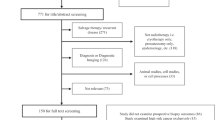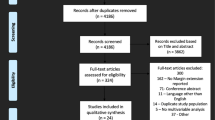Abstract
Background
The prognostic significance of PSA bounce following definitive radiation therapy remains controversial. To develop a sense of current opinion in this area, we performed a systematic search of the literature based on the Preferred Reporting Items for Systematic Reviews and Meta-Analyses.
Methods
In January 2021, we systematically searched PubMed, the Cochrane library, and Scopus for studies that compared patients who had localized prostate cancer with or without PSA bounce after definitive radiation therapy. Our objective was to evaluate the association of PSA bounce with biochemical recurrence-free survival, metastatic-free survival, cancer-specific survival, and overall survival, using multivariate Cox regression analysis.
Results
A total of 8881 patients in 10 studies matched the selection criteria for the systematic review and meta-analysis. The number of patients with PSA bounce accounted for 2706 of all 8881 patients (30.5%). PSA bounce was associated with better biochemical recurrence-free survival after definitive radiation therapy (pooled HR: 0.62, 95% CI: 0.54–0.71). Subgroup analyses also showed that PSA bounce was independently associated with decreased risk for biochemical recurrence-free survival in prostate cancer patients treated with low dose rate brachytherapy alone (pooled HR: 0.38, 95% CI: 0.27–0.55) and external beam radiotherapy alone (pooled HR: 0.71, 95% CI: 0.57–0.87).
Conclusions
This meta-analysis indicated that PSA bounce after definitive radiation therapy is related to improved outcome in terms of biochemical failure in prostate cancer patients.
This is a preview of subscription content, access via your institution
Access options
Subscribe to this journal
Receive 4 print issues and online access
$259.00 per year
only $64.75 per issue
Buy this article
- Purchase on Springer Link
- Instant access to full article PDF
Prices may be subject to local taxes which are calculated during checkout




Similar content being viewed by others
References
Siegel RL, Miller KD, Jemal A. Cancer statistics, 2020. CA Cancer J Clin. 2020;70:7–30.
Ito K. Prostate cancer in Asian men. Nat Rev Urol 2014;11:197–212.
Ito K, Saito S, Yorozu A, Kojima S, Kikuchi T, Higashide S, et al. Nationwide Japanese Prostate Cancer Outcome Study of Permanent Iodine-125 Seed Implantation (J-POPS): first analysis on survival. Int J Clin Oncol 2018;23:1148–59.
Zaorsky NG, Keith SW, Shaikh T, Nguyen PL, Horwitz EM, Dicker AP, et al. Impact of radiation therapy dose escalation on prostate cancer outcomes and toxicities. Am J Clin Oncol 2018;41:409–15.
King CR, Brooks JD, Gill H, Presti JC Jr. Long-term outcomes from a prospective trial of stereotactic body radiotherapy for low-risk prostate cancer. Int J Radiat Oncol Biol Phys 2012;82:877–82.
Ash D, Flynn A, Battermann J, de Reijke T, Lavagnini P, Blank L. ESTRO/EAU/EORTC recommendations on permanent seed implantation for localized prostate cancer. Radiother Oncol 2000;57:315–21.
Zietman AL, DeSilvio ML, Slater JD, Rossi CJ Jr., Miller DW, Adams JA, et al. Comparison of conventional-dose vs high-dose conformal radiation therapy in clinically localized adenocarcinoma of the prostate: a randomized controlled trial. JAMA 2005;294:1233–9.
Partin AW, Oesterling JE. The clinical usefulness of prostate specific antigen: update 1994. J Urol 1994;152:1358–68. 5 Pt 1
Pickles T. Prostate-specific antigen (PSA) bounce and other fluctuations: which biochemical relapse definition is least prone to PSA false calls? An analysis of 2030 men treated for prostate cancer with external beam or brachytherapy with or without adjuvant androgen deprivation therapy. Int J Radiat Oncol Biol Phys 2006;64:1355–9.
Darwis NDM, Oike T, Kubo N, Gondhowiardjo SA & Ohno T Characteristics of PSA bounce after radiotherapy for prostate cancer: a meta-analysis. Cancers. 2020;12:2180.
Åström L, Sandin F, Holmberg L. Good prognosis following a PSA bounce after high dose rate brachytherapy and external radiotherapy in prostate cancer. Radiother Oncol 2018;129:561–6.
Hinnen KA, Monninkhof EM, Battermann JJ, van Roermund JG, Frank SJ, van Vulpen M. Prostate specific antigen bounce is related to overall survival in prostate brachytherapy. Int J Radiat Oncol Biol Phys 2012;82:883–8.
Charret J, Baumann AS, Eschwege P, Moreau JL, Bernier V, Falk AT, et al. Prostate-specific antigen bounce in patients treated before 60 years old by iodine 125 brachytherapy for prostate cancer is frequent and not a prognostic factor. Brachytherapy 2018;17:888–94.
Bernstein MB, Ohri N, Hodge JW, Garg M, Bodner W, Kalnicki S, et al. Prostate-specific antigen bounce predicts for a favorable prognosis following brachytherapy: a meta-analysis. J Contemp Brachytherapy 2013;5:210–4.
Liberati A, Altman DG, Tetzlaff J, Mulrow C, Gøtzsche PC, Ioannidis JP, et al. The PRISMA statement for reporting systematic reviews and meta-analyses of studies that evaluate health care interventions: explanation and elaboration. PLoS Med 2009;6:e1000100.
Stang A. Critical evaluation of the Newcastle-Ottawa scale for the assessment of the quality of nonrandomized studies in meta-analyses. Eur J Epidemiol 2010;25:603–5.
Deeks JJ, Dinnes J, D’Amico R, Sowden AJ, Sakarovitch C, Song F, et al. Evaluating non-randomised intervention studies. Health Technol Assess 2003;7:1–173. iii-x
Altman DG, Bland JM. How to obtain the confidence interval from a P value. BMJ 2011;343:d2090.
Altman DG, Bland JM. How to obtain the P value from a confidence interval. BMJ 2011;343:d2304.
DerSimonian R, Kacker R. Random-effects model for meta-analysis of clinical trials: an update. Contemp Clin Trials 2007;28:105–14.
DerSimonian R, Laird N. Meta-analysis in clinical trials. Controlled Clin Trials 1986;7:177–88.
Higgins JP, Thompson SG, Deeks JJ, Altman DG. Measuring inconsistency in meta-analyses. BMJ 2003;327:557–60.
Hanlon AL, Pinover WH, Horwitz EM, Hanks GE. Patterns and fate of PSA bouncing following 3D-CRT. Int J Radiat Oncol Biol Phys 2001;50:845–9.
Stock RG, Stone NN, Cesaretti JA. Prostate-specific antigen bounce after prostate seed implantation for localized prostate cancer: descriptions and implications. Int J Radiat Oncol Biol Phys 2003;56:448–53.
Zwahlen DR, Smith R, Andrianopoulos N, Matheson B, Royce P, Millar JL. Prostate-specific antigen bounce after permanent iodine-125 prostate brachytherapy-an Australian analysis. Int J Radiat Oncol Biol Phys 2011;79:179–87.
Naghavi AO, Strom TJ, Nethers K, Cruz AA, Figura NB, Shrinath K, et al. Clinical implications of a prostate-specific antigen bounce after radiation therapy for prostate cancer. Int J Clin Oncol 2015;20:598–604.
Romesser PB, Pei X, Shi W, Zhang Z, Kollmeier M, McBride SM, et al. Prostate-Specific Antigen (PSA) bounce after dose-escalated external beam radiation therapy is an independent predictor of psa recurrence, metastasis, and survival in prostate adenocarcinoma patients. Int J Radiat Oncol Biol Phys 2018;100:59–67.
Roy S, Loblaw A, Cheung P, Chu W, Chung HT, Vesprini D, et al. Prostate-specific antigen bounce after stereotactic body radiotherapy for prostate cancer: a pooled analysis of four prospective trials. Clin Oncol 2019;31:621–9.
Slade AN, Dahman B, Chang MG. Racial differences in the PSA bounce in predicting prostate cancer outcomes after brachytherapy: evidence from the Department of Veterans Affairs. Brachytherapy 2020;19:6–12.
Critz FA, Williams WH, Benton JB, Levinson AK, Holladay CT, Holladay DA. Prostate specific antigen bounce after radioactive seed implantation followed by external beam radiation for prostate cancer. J Urol 2000;163:1085–9.
Mitchell DM, Swindell R, Elliott T, Wylie JP, Taylor CM, Logue JP. Analysis of prostate-specific antigen bounce after I(125) permanent seed implant for localised prostate cancer. Radiother Oncol 2008;88:102–7.
Yamamoto Y, Offord CP, Kimura G, Kuribayashi S, Takeda H, Tsuchiya S, et al. Tumour and immune cell dynamics explain the PSA bounce after prostate cancer brachytherapy. Br J Cancer 2016;115:195–202.
Kubo M, Satoh T, Ishiyama H, Tabata KI, Tsumura H, Komori S, et al. Enhanced activated T cell subsets in prostate cancer patients receiving iodine-125 low-dose-rate prostate brachytherapy. Oncol Rep 2018;39:417–24.
Roach M 3rd, Hanks G, Thames H Jr., Schellhammer P, Shipley WU, Sokol GH, et al. Defining biochemical failure following radiotherapy with or without hormonal therapy in men with clinically localized prostate cancer: recommendations of the RTOG-ASTRO Phoenix Consensus Conference. Int J Radiat Oncol Biol Phys 2006;65:965–74.
Critz FA, Williams WH, Levinson AK, Benton JB, Schnell FJ, Holladay CT, et al. Prostate specific antigen bounce after simultaneous irradiation for prostate cancer: the relationship to patient age. J Urol 2003;170:1864–7.
Acknowledgements
The authors thank Lee Seaman of Seaman Medical, Inc., Bellingham WA USA for English language editing.
Author information
Authors and Affiliations
Corresponding author
Ethics declarations
Conflict of interest
The authors declare no competing interests.
Additional information
Publisher’s note Springer Nature remains neutral with regard to jurisdictional claims in published maps and institutional affiliations.
Rights and permissions
About this article
Cite this article
Urabe, F., Kimura, S., Tashiro, K. et al. Prognostic value of PSA bounce in prostate cancer following definitive radiation therapy: a systematic review and meta-analysis. Prostate Cancer Prostatic Dis 24, 976–985 (2021). https://doi.org/10.1038/s41391-021-00372-x
Received:
Revised:
Accepted:
Published:
Issue Date:
DOI: https://doi.org/10.1038/s41391-021-00372-x
This article is cited by
-
How long is long enough to secure disease control after low-dose-rate brachytherapy in combination with other modalities in intermediate-risk, localized prostate cancer?
International Journal of Clinical Oncology (2022)
-
PSA bounce, prognosis, and clues to the radiation response
Prostate Cancer and Prostatic Diseases (2021)



